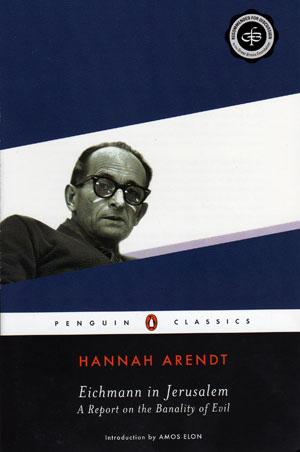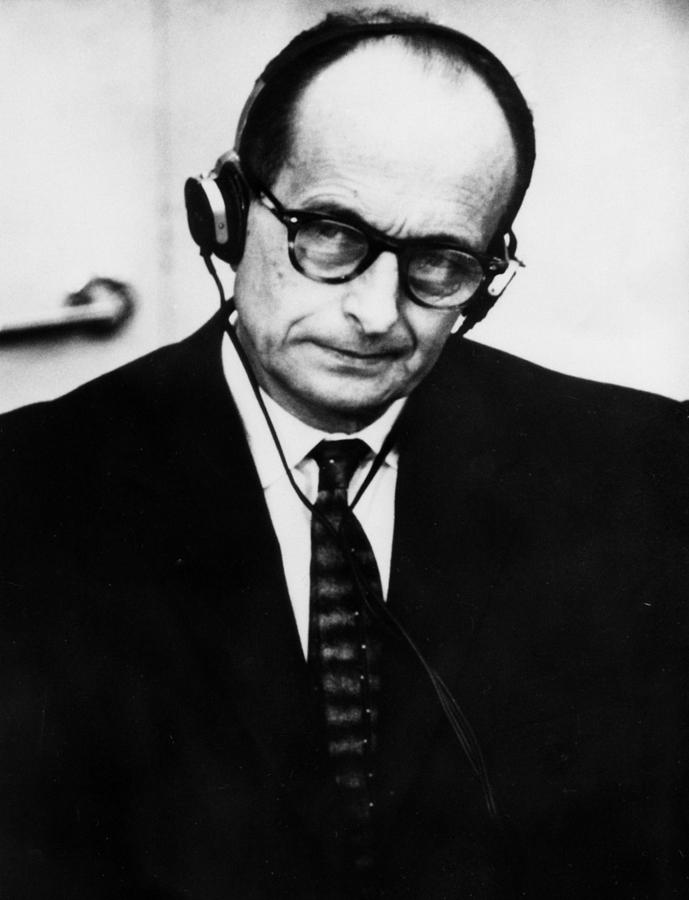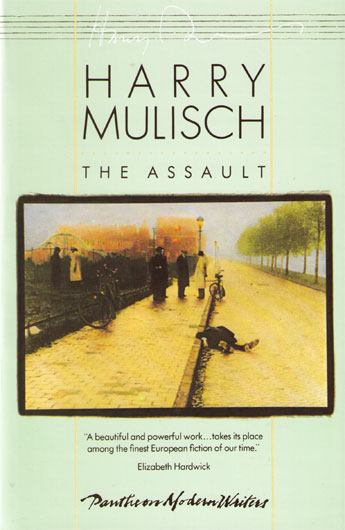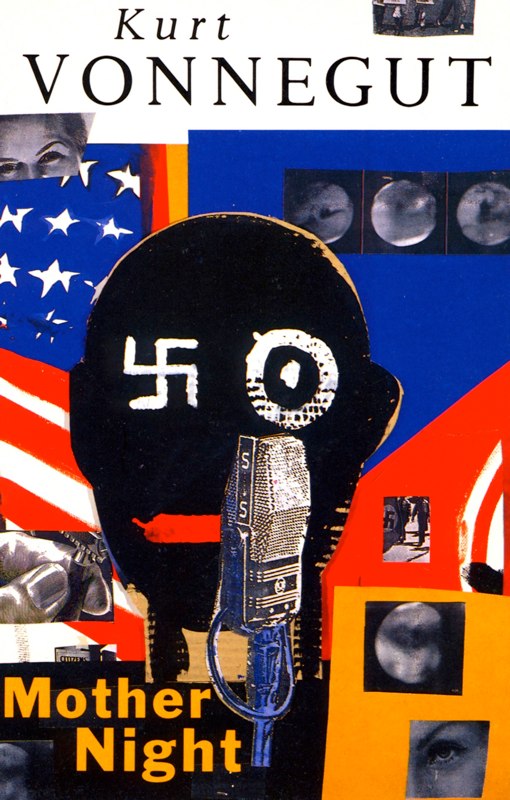I re-read Hanah Arendt’s “Eichmann in Jerusalem,” inspired to do so by the film “Hannah Arendt.” By the way, the subtitle “The Banality of Evil” is implicit in the book and stated only on the last page by way of conclusion on page 252. At the end of this review staunch readers will find a note about Howard W. Campbell at the end. (Don’t know about Campbell? Then read on to find out.)

Despite the furore at the time, portrayed in the film, Arendt did not:
1. In any sense exonerate Eichmann,
2. Condemn Jews in any way,
4. Blame Jews for their own destruction,
5. Assail the court proceedings,
6. Oppose the death sentence,
7. Question the legitimacy of the trial, and
8. Assert that Eichmann was a Zionist.
Though each of these lies was said at the time dutifully repeated by those that do not think but react.
Once one of these falsehoods was said, it was repeated by other journalists too lazy or irresponsible to check the facts, long before Rupert Murdoch could be blamed. Needless to say none of the journalists who recycled these falsehoods ever apologised.
Nor was such intellectual laziness limited to journalists. Over the years I have heard them from academics who should know better than believe everything they read, something they quickly condemn in students while doing it themselves.
First things first, the role of Jews in their own destruction is there, reported as fact throughout the book, the local organization of the Jewish Council. Where a Jewish Council did not exit the Nazis tried to set one up. Some Jews who cooperated with the Nazis in these councils were later themselves tried for crimes in the Successor Trials that followed The Nuremberg Trials but not specifically for crimes against Jews. She does not sensationalise this Jewish cooperation, and acknowledges that in its early stages in Western Europe it may well have seemed the best thing to do.
She also points out that others cooperated in their own destruction at times when whole peoples were moved, deported, and then murdered. Likewise she is very clear that resistance was impossible.
In all these references to Jewish cooperation amount to, say, fifteen pages of the 300 in the book. Perhaps a little more.
Second, it is forcefully argued that Eichmann in Jerusalem was demonised in order to allow the trial to tell the whole story of Jewish persecution and destruction. That is why the prosecution introduced volumes of material that had nothing to do with Eichmann. He was a cog, albeit a vital one, but nonetheless a cog, not a director, decision-maker, influencer of others. He was a cog who could have been easily replaced. But the trial was not about him, and is that not what trials are supposed to be about, the defendent. In exile on Argentina, Eichmann did boast of his part in the Final Solution, true, but perhaps he did this to ingratiate himself with the exiled Nazis he found there as much as anything else. Men do brag and exaggerate, now don’t they?
Third, all the nations occupied by the Nazis had Successor Trials shortly after the Nuremberg Trials. None of these trials presented indictments about murdering Jews. Having no state, Jews did not. Israel as the Jewish state had as much right to hold such trials as any other state, she concludes.
Eichmann’s self-defense was that the emigration, evacuation, and destruction of Jews were acts of the German state which were above the law and normal morality. Though he did often refer to orders, “ein befehl ist ein befehl,” and even mentioned Immanual Kant. His six-day interrogation, his testimony in the trial, his many written submissions are muddled, inconsistent, repetitive. He was working only from memory in Jerusalem and he was not a bright man to begin with. No Albert Speer he.
While rejecting resistance as a possibility she also reviews and dismisses the pop psychology explanations of the Jewish cooperation in their own destruction as some kind of death wish. One reviewer of the book said the same of her. That she had written a negative book about Jews because she hated herself as a Jew. There is no limit to imbecility.
All of Eichmann’s social, intellectual, bureaucratic superiors knew and accepted the destruction of Jews. Who was this functionary, one-time salesman, to judge compared to them? Remember not all the professional officials were Nazi thugs. At The Wannsee Conference where Eichmann did the coffee, Count Ernst von Weisacker represented the Foreign Office. Eichmann was thrilled to be in such distinguished company at the time.
There seems also to have been a big difference between the approach to the Final Solution in Eastern Europe compared to Western Europe. In the east there was no local government, e.g., Poland, a puppet government, e.g., Croatia, or a Fascist ally like Hungary. Sometimes for a while Western European Jews had some protection afforded by their own governments, although Jewish refugees say in France were surrendered quickly. But by 1944 even this protection was not enough. Italy seems overall to be the best place for any Jew, including refugees who could disappear into the crowds, hills, forests. Bulgaria is another country where the unwillingness of locals to cooperate stymied the Nazi killing machine. Belgium is another exception because there many, many Jewish refugees and almost no Jewish organization, the Nazis had no place to start. But almost from the start German, Polish, and Russian Jews were murdered on an industrial scale. By 1944 nothing stopped the Death Machine.

Eichmann on trial
Her argument is that the crimes were unprecedented and so the justice done them had to be likewise unprecedented. [Everyone knew they were crimes which is why all the euphemisms were used. She does not consider this point, though she notes how seldom there was an explicit reference to extermination, killing, murder, etc.]. Law serves justice. Law should not thwart justice. No graduate of a law school would ever say that!
She has many criticisms of the lackadaisical and incompetent defense attorney who seemed to neither know nor care much about the events, Eichmann, or the trial. She is also very scathing about the melodramatic, wandering prosecutor who never seemed to focus on the accused.
In the end we have great evil partly done by this pathetic, hardworking, if stupid and unimaginative individual. He was shallow, unread, incapable of learning from his experiences, unreflective and untroubled by what he was doing. What he did care about was his career advancement and he spent lot of time, rather incompetently, trying to secure promotion. He never read a book, certainly not a novel, a poem, or a play, and probably nothing more taxing than a few pages in coffee table books, if that. He flunked out of both high school and vocational training. He repeated clichés and stock phases he heard without grasping their meaning or their trite nature. He is no Faust aware that he had sold his soul to the devil for a few magic tricks.
The Nazis were able to destroy as many Jews as they did, in part, because Jewish communities were so well organized and disciplined. When the Jewish Council in Poznan told a list of families to assemble at the train station for resettlement, they did. This order made the fiction easier to bear, as Eichmann dimly realized, but it made the killing easier. If the Jewish Council had told the truth, it is not resettlement but murder, or refused to cooperate the result would have been terrible, but perhaps fewer would have died. Perhaps. It is a question Arendt asks, and she speculates that fewer would have died though with foreknowledge and dread. Does the doctor tell the terminal patient the truth of allow the patient to die in hope?
Safe to say we have all met people like this Eichmann, but fortunately none of them held the power of life and death over us. They even exist in universities, a PhD is no guarantee of thinking. [Jackson pauses to recall several exemplars.] We all react to stimuli but seldom do any of us think. Some people never do. Ameboa react to stimuli, too.
Not everyone who does great evil is a fearsome demon. Readers may recall that in Fyodor Dostoyevsky’s novel “The Brothers Karamazov” the devil that visits Ivan is a dirty, smelly, stupid, and vulgar lout. He is no Mephistopheles, but rather Anyman. Simone de Beauvoir said something similar about Pierre Laval, evil but insignificant. Of course, years after their crimes, defeated,captured, reduced to prisoners, not even vicious killers seem very threatening.
The book exudes urgency and importance. The prose is hard and clean, no embellishments, no learned references, very few citations of other studies though some. It is easy to imagine the author pounding it out on a typewriter to meet a deadline, not an editorial one, but In this case a moral one, namely get it all and get it right. There will never be another chance. Of course, she made mistakes in proper names, sometimes, in dates by a week or a month, and there are overstatements a few times. These errors have been pounced on by reviewers for years, who themselves evidently have never made a mistake, to discredit the entire book.
I noted that the Dutch journalist Harry Mulisch is cited a few times. I found his novel “The Assault” a compelling book, ditto the film based on it. Infinitely sad and yet somehow satisfying it was when the message is at last delivered. That would have been a better name for the novel, “The Message.”

In reading this book again I was reminded of Kurt Vonnegut’s “Mother Night” and it’s protagonist Howard W. Campbell who never laid a finger on anyone, spied on Nazis at great personal risk, sublimated his own personality to his espionage, and …. was a war criminal because “you are what you do.”

Skip to content
